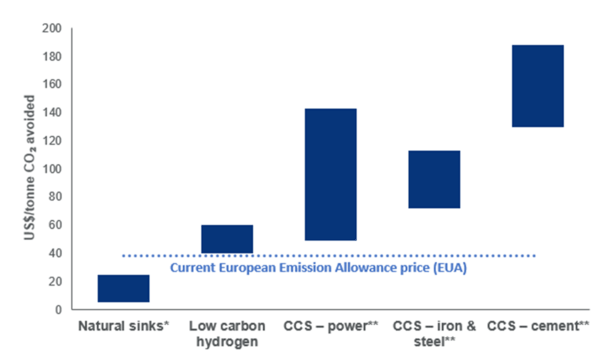News Release from Wood Mackenzie Ltd
Wind Industry Profile of
Europe needs to change course to hit 2030 emissions target
Europe’s new 2030 emissions target of a 55% reduction over 1990 levels has made it the undisputed global leader in climate ambition. However, with the region still a long way from achieving this rapidly approaching goal, dramatic changes are needed.
As noted in the Wood Mackenzie report ‘Fast and furious: Europe’s race to slash emissions by 2030’, Wood Mackenzie’s base case forecast sees the bloc falling short of its goal, delivering a 46% reduction over 1990 levels.
An accelerated energy transition for the EU, consistent with limiting global warming to no more than 2 degrees C, would take Europe much closer to the 2030 target. Wood Mackenzie’s 2-degrees scenario includes some sharp changes from their base-case scenario:
- Electric vehicles (EVs) and plug-in hybrids must reach 97% of the EU’s passenger vehicle sales by 2030.
- Wind and solar power generation capacity must grow by 162 GW and 253 GW, respectively, over 2020 levels – underpinned by rapid scaling of grid infrastructure.
- Coal-plant retirements, of 85 GW by 2030, must be accelerated, alongside a carbon cost that maximises coal-to-gas switching.
However, even that 2-degree scenario only gets the EU to a 53% cut in emissions by 2030; it would take another two years to get to 55%.
Murray Douglas, Wood Mackenzie Research Director, said: “To hit the 2030 target, Europe will have to do everything we have assumed, but quicker. Moreover, as the potential to do more on renewables and EV penetration is limited, it will have to push harder in three key areas: energy efficiency and the electrification of buildings, reducing the amount of travel, and reform of the carbon market.
“The EU’s Emissions Trading System (ETS) covers around half of the bloc’s CO2 emissions. A large-scale expansion of the scheme to other sectors is unlikely, but maritime emissions are likely to be included. Still, the fact that ETS sectors will only deliver a third of the targeted reductions by 2030 underscores the need for reform. Reform should centre on two key areas:
- Providing more certainty over the cost of carbon that investors need to make structural changes and large capital investments.
- Ensuring European industries are exposed to a carbon cost which incentivises decarbonisation without increasing the risk of carbon leakage.
“Certainty over the cost of carbon by 2030 would accelerate coal phase-out plans, as it did in the UK. Renewable generation would be more competitive, and the array of projects would expand. The rapidly growing pipeline of low-carbon hydrogen projects would be bolstered, and the market would become more engaged in the development of carbon capture and storage (CCS).”
Carbon abatement cost ranges (2030)

Source: Wood Mackenzie Energy Transition Service. * Nature-based solutions, such as forestry projects; ** CCS in power and industry assumes 90% capture rates. European Emission Allowance price (EUA) from 1 February 2021
Gas will remain resilient to 2030 amid a 55% emissions reduction, according to the report. Wood Mackenzie estimates that LNG will account for 27% of the EU’s gas supply mix by 2030. Pressure to cut carbon and methane emissions will push LNG suppliers to reduce emissions from well to customer.
“For gas to secure a future beyond 2030, large-scale CCS must become a reality for gas-fired power and hard-to-abate industries,” added Douglas.
Investment by private capital chasing low-carbon opportunities will be key. Governments will have to ‘crowd in’ private sector investment with incentives. Such a formula has already delivered renewables growth, with feed-in-tariffs and guaranteed offtake underpinning returns for investors.
“Some of the biggest opportunities will be in the build-out of wind, solar and storage capacity, which will require US$585 billion of investment by 2030, and in the grid infrastructure needed to transform the electricity market. Europe must rapidly shift from a power market where centrally dispatched supply follows demand to one where demand can respond to an increasingly variable, weather-driven supply from renewable sources,” said Douglas.
European policymakers will need to make difficult and, in many cases, unpopular decisions to deliver greater emissions reductions. However, the region also hopes that its bold step will inspire other nations to do the same. Particularly in setting interim goals such as Europe’s 2030 target.
Ahead of the United Nations Climate Change Conference (COP26) in Glasgow in November 2021, which is intended to spur greater global commitment to tackling climate change, all eyes will be on how Europe maps out its path to net zero.
- Source:
- Wood Mackenzie
- Author:
- Press Office
- Link:
- www.woodmac.com/...
- Keywords:
- Europe, EU, climate coal, 2030, miss, target, energy transition, enewable energy, pace, GW, wind, solar, hybrid, decarbonisation, scale, infrastructure, hydrogen


























